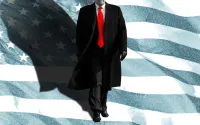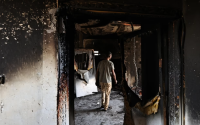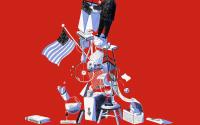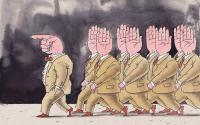MAR DEL PLATA, Argentina (Reuters) - Shopkeepers boarded up storefronts and residents fled town on Thursday as thousands of demonstrators prepared to protest against U.S. President George W. Bush at an Americas-wide presidential summit at this Argentine seaside resort.
Bush arrived late on Thursday for the two-day Summit of the Americas but sentiment against him runs high in Argentina due to opposition to the Iraq war and to U.S.-backed, free-market policies that many say pushed millions into poverty.
Leftist activists mostly from Latin America are holding an alternative Peoples' Summit and Bush's main critic in the region, leftist Venezuelan President Hugo Chavez, was due to speak in that forum on Friday.
The war of words between Bush and Chavez over trade and development was expected to take center stage at the formal summit, where Washington will urge Latin American states to further open their economies.
"We hope protests are carried out in a peaceful way, but if they are not, we are prepared to give wrongdoers a forceful response," said Federal Police commissioner Daniel Rodriguez.
"People see all the iron barricades and police on every corner and they get scared," said construction worker Hernan Brito, who received five last-minute requests to board up store windows from merchants worried about possible looting.
U.S. interests including Blockbuster video stores and Citibank branches were covered with corrugated metal shields ahead of protest marches planned early on Friday.
More than 7,500 police officers erected a security ring around summit hotels and paroled the streets and beaches of this normally bustling city of 600,000, which looked more like a ghost town. Coast guard boats watched the shoreline and air space was restricted. Most schools canceled classes.
MARADONA, PROTESTERS EN ROUTE
A Chavez-sponsored train was bringing anti-Bush celebrities like Argentine soccer legend Diego Maradona and Bolivian presidential front-runner, indigenous leader Evo Morales to the city. Chavez himself was to fly in.
U.S. anti-war activist Cindy Sheehan and other relatives of soldiers killed in Iraq were also expected in town.
We are here to share in the fight that starts in the communities and barrios," said Morales, a fierce Bush critic.
Cuba's Fidel Castro, the only leader not invited to the summit, sent a delegation of Cuban athletes to the Peoples' Summit to support his friend Chavez.
"We want to send a message to President Bush that the U.S. way is not the only way," said Veronica Gomez, a 34-year-old Argentine secretary who plans to march.
Argentina's "piqueteros" -- the militant unemployed group that sprang to fame during the country's 2001-2002 economic crisis -- are organizing their own march for Friday.
The tension in Mar del Plata, spread to the capital Buenos Aires, 250 miles to the north, where two separate riots broke out this week. The government blamed a mix of labor and leftist groups for the destructive rampages.
In Argentina, the summit of 34 leaders will concentrate on job creation as the key to long-term prosperity in Latin America, where the $3,000 per capita income is less than 10 percent of the U.S. average.
Washington's goal is to convince Latin Americans to "unlock" or further open their economies to boost investment, trade and jobs, said Tom Shannon, U.S. assistant secretary for the Western Hemisphere at the State Department.
A more prickly issue, the U.S. push to restart stalled talks for the Free Trade Area of the Americas or FTAA in 2006, may not make much progress in the forum due to resistance among Latin America's big economies, fearful of the impact on their farm sectors.
(Additional reporting by Steve Holland on Air Force One, Hilary Burke in Buenos Aires, Raymond Colitt in Brasilia, and Patricia Avila in Mar del Plata)






